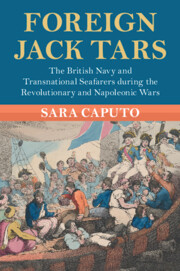 Foreign Jack Tars
Foreign Jack Tars Book contents
- Foreign Jack Tars
- Modern British Histories
- Foreign Jack Tars
- Copyright page
- Dedication
- Contents
- Figures
- Tables
- Acknowledgements
- Introduction
- Part I The State
- Part II The Nation
- 3 A Babel and a Gehenna
- 4 ‘Complexions of Every Varied Hue’
- 5 ‘They Cannot Keep the Sea beyond a Passage’
- 6 ‘From among the Northern Nations Alone’
- Part III Displacement
- Conclusion
- Book part
- Bibliography
- Index
5 - ‘They Cannot Keep the Sea beyond a Passage’
The Royal Navy and Recruitment in the Two Sicilies
from Part II - The Nation
Published online by Cambridge University Press: 03 November 2022
- Foreign Jack Tars
- Modern British Histories
- Foreign Jack Tars
- Copyright page
- Dedication
- Contents
- Figures
- Tables
- Acknowledgements
- Introduction
- Part I The State
- Part II The Nation
- 3 A Babel and a Gehenna
- 4 ‘Complexions of Every Varied Hue’
- 5 ‘They Cannot Keep the Sea beyond a Passage’
- 6 ‘From among the Northern Nations Alone’
- Part III Displacement
- Conclusion
- Book part
- Bibliography
- Index
Summary
Chapter 5 is a case study, further pursuing the conclusions of Chapters 3 and 4, and analysing an example of ‘hard-to-integrate’ foreigner: southern Italian sailors were imagined by British officers and policymakers through the lens of substantial racial stereotypes, compounded by cultural, linguistic, and religious differences, mutual unfamiliarity, and the Mediterranean’s geographical distance from the British world. This did not mean that it was deemed impossible to turn these seamen into useful and respected crew members. However, it did mean that, if this was to happen, they needed to be completely removed from the structures of their own state, and particularly from the influence and perceived corruption and inefficiency of Neapolitan and Sicilian officers. The imbalanced power dynamic between Britain and the Kingdom of the Two Sicilies, which during the French Wars came to depend entirely on the Royal Navy, led to frequent manpower exchange, and affected the interactions between British and Neapolitan officers. Collaboration and patronage flourished, but so did acrimony and rivalry. This tense undercurrent offered British officers a chance of separating the seamen whom they were reclaiming as perfectly good recruits from the stereotypes of corruption and unreliability that they associated with those seamen’s country.
Keywords
- Type
- Chapter
- Information
- Foreign Jack TarsThe British Navy and Transnational Seafarers during the Revolutionary and Napoleonic Wars, pp. 143 - 175Publisher: Cambridge University PressPrint publication year: 2022
